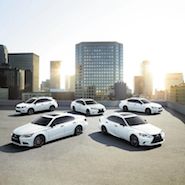- About
- Subscribe Now
- New York,
August 26, 2015

Luxury automakers earned top ratings in this year’s American Customer Satisfaction Index, with all but one scoring above the record lowest average in more than a decade.
Record numbers of recalls and rising prices contributed to the third consecutive dip in sentiment in three years, with 15 of the 27 automakers studied showing a decline in consumer satisfaction. When problems arise, how an automaker handles them can make a great impact on consumers' feelings toward the brand.
"It’s all about offering premium quality at a premium price," said David VanAmburg, managing director of ACSI. "Purchasers of luxury OEMs know they will pay a lot more, but expect a much higher standard of quality both in terms of features and reliability and these brands deliver consistently."
The American Customer Satisfaction Index (ACSI) is an independent measure of consumers’ approval of the quality of products. For the ACSI Automobile Report 2015, 4,294 consumers were randomly selected by email and given a survey between April 22 and June 15, which asked about their recent purchase experiences with the largest OEMs, determined by market share.
Losing favor
Last year, the automotive industry saw 64 million vehicles recalled, twice the previous record in 2004. Compared to last year, 40 percent more survey respondents noted recalls.
Porsche recalled vehicles last year
Perhaps as a result, the ACSI registered its lowest score since 2004, with a combined 79 points out of 100.
The economy has improved, leaving consumers with more money to spend on upgrading their cars, boosting demand and prices. Higher sale cost also erodes consumer satisfaction, pushing sentiment back down to where it was pre-recession.
However, luxury car buyers may be less cost-sensitive, leaving them feeling more satisfied in a purchase than their counterparts shopping for mass make vehicles.
Lexus tops the rankings with 84 points, retaining its score among the general decline and ousting Mercedes-Benz from its number one position. Mercedes’ 86 points in 2014 dipped 3 percent to 83 this year, placing it in fourth place.
Mercedes GLC fashion ad
One of only two automakers who saw an increase, BMW rose to 82 from 80 in 2014, placing it right behind fellow German maker Mercedes.
This follows the trend that 77 percent of foreign automakers scored above average.
Of the luxury automakers OEMs studied, Audi was the only one that scored below the 79 average across the index. The brand’s 79 score last year dropped 1 point to 78.
Audi A3
Luxury automotive brands are increasing differentiation tactics as the market becomes clogged with new competitors, according to a separate report by Frost & Sullivan.
Evolving preferences among consumers are pushing automakers to incorporate more digital touchpoints into both vehicles and branded experiences. Although the concept of brand differentiation is nothing new, brands are finding that the experience promised and offered sometimes matters more than the car (see story).
Total recall
The luxury car industry has not been immune to the recent flood of recalls.
In July last year, German automaker BMW recalled 1.6 million 3 Series vehicles produced between 1999 and 2006 as a measure of caution.
The airbag in the targeted vehicle could potentially explode in certain circumstances, and the brand wanted to remove all likelihood of a crisis. Following the rolling crisis at General Motors, automakers everywhere must be extra diligent about vehicle safety (see story).
No driver likes to learn that his vehicle is at risk of combusting, especially if it is a new trophy car, but drivers of the 2014 Porsche 911 GT3 may have found subsequent solace in the brand’s diligence.
Two 911 GT3′s sustained engine damage and then caught on fire, prompting the automaker to recall all 785 of the vehicles worldwide last February. The absence of injuries and the comparatively small recall number is unlikely to dent consumer confidence in the brand (see story).
Luxury automakers tend to get ahead of the problem before disaster strikes, perhaps leading to their retained consumer confidence.
"Typically recalls signal issues with lagging quality, but there is also a psychological facet at play, where recalls can impact the level of trust customers have in their preferred auto brands," Mr. VanAmburg said.
Final Take
Sarah Jones, staff reporter on Luxury Daily, New York
Share your thoughts. Click here